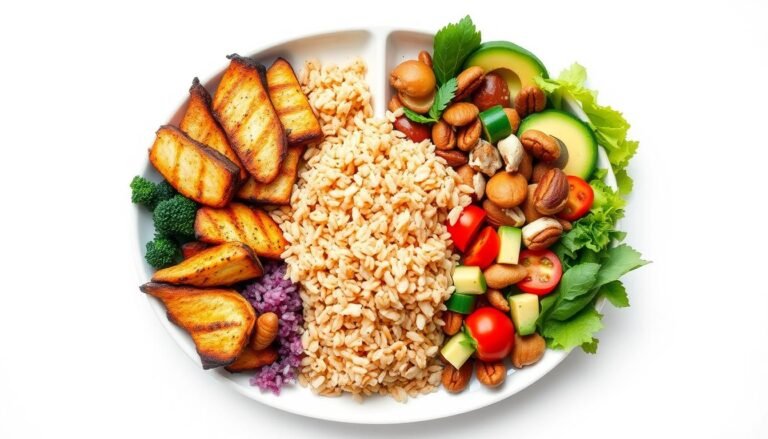Ever thought about how a The concept of a cheat meal can help boost your metabolism if used correctly. might affect your fitness goals? The science behind cheat meals is complex and interesting. It challenges many myths about weight loss goals and the role of certain foods. In this article, we’ll dive into the latest research on cheat meals. We’ll look at their effects on your body and mind, and the good and bad sides of them.

Key Takeaways
- Cheat meals can temporarily boost leptin production and metabolism, but long-term overconsumption can lead to leptin resistance.
- Proper timing and portion control of cheat meals can minimize the risk of weight gain and support overall fitness goals.
- Restrictive “clean eating” diets can increase cravings for cheat meals, highlighting the importance of balanced nutrition.
- Cheat meals can have both physiological and psychological impacts, requiring a holistic approach to implementation.
- Maintaining a sustainable, flexible mindset towards cheat meals is crucial for long-term success.
Understanding Cheat Meals: Definition and Purpose
Cheat meals are short breaks from strict diets. They let people enjoy foods they normally can’t without worrying about calories. These breaks help in many ways, like giving mental relief, boosting metabolism, and making sticking to diets easier.
Common Misconceptions About Cheat Meals
Many think cheat meals harm weight loss efforts. Others might eat too much, which can backfire on their fitness goals.
Why People Include Cheat Meals in Their Diet
Cheat meals are rewards for reaching goals or satisfying cravings, and can help maintain caloric balance while fitting into a meal plan. They also help “reset” metabolism and refill energy stores. How often and how much you can cheat depends on your fitness level.
The Psychology Behind Cheat Meals
Cheat meals help manage feelings of being deprived and can improve overall eating behavior. They make dieting feel more sustainable. But, it’s important to keep cheat meals in check to avoid negative effects on your physique, especially if you want to stay skinny on cheat days.
“Cheat meals can support fat loss by potentially keeping metabolic rates up and preventing plateaus in the weight loss journey.”
Using cheat meals wisely, like after workouts, can help with sticking to diets and can be a great way to indulge responsibly. It also satisfies cravings without ruining progress. Managing cheat meals well can bring mental benefits with few downsides.

The Scientific Foundation of Strategic Eating
Metabolic health and calorie cycling are key to strategic eating, which includes cheat meals. This method aims to control hormonal and metabolic responses. It helps manage weight and improve overall health.
Leptin, a hormone, is central to this strategy of managing energy expenditure. It helps control hunger and how much energy we use. When we eat fewer calories, leptin levels drop, which can slow down our metabolism. Eating more, mainly carbs, can help raise leptin levels and speed up our metabolism.
“Strategic eating, including the incorporation of cheat meals, is a scientifically-backed approach that aims to leverage the body’s natural hormonal and metabolic responses for improved overall health and fitness.”
But, not everyone agrees on how well this works for achieving weight loss goals. Some studies show good results, while others are less clear. It’s important to understand this approach well and adjust it to fit your needs, especially regarding caloric intake.

At its core, strategic eating is about how hormones, metabolism, and calorie changes interact, which can also include the benefits of cheat meals. Knowing this can help you make smart choices about cheat meals and other eating strategies. This way, you can improve your health and fitness.
Cheat Meals Science: Impact on Metabolism and Hormones
Cheat meals can greatly affect your metabolism and hormones when used wisely. Studies show that eating more for a short time can raise leptin levels by up to 30% for 24 hours. This can make you feel fuller and might slightly increase how much energy you burn, particularly if you incorporate cheat days into your routine.
Effects on Leptin Production
Leptin is a hormone key in telling your brain when you’ve eaten enough, especially after a cheat meal. During a cheat meal, leptin levels go up. This makes your body think it needs to use fat for energy, which can be beneficial if you stick to your diet plan. This can help fight body fat. leptin resistance, a problem for those who diet a lot.
Metabolic Response to Overfeeding
The body’s reaction to eating more than usual is complex. Some studies say you might burn 3-10% more energy for up to 24 hours. But, how you react can depend on many things like your genes and diet history.
Hormonal Changes During Cheat Meals
Cheat meals also change other hormones like insulin and cortisol, and it’s important to remember that they can influence leptin levels as well. These changes can affect how your body uses nutrients, muscle recovery, and even your mood. The long-term effects of cheat meals on hormones and health are still being studied. But, the short-term benefits can be big for many people.
“Cheat meals can provide a crucial psychological and physiological boost, but it’s essential to find the right balance and not let them derail your overall progress.”
Benefits of Planned Diet Breaks
Planned Diet breaks can be beneficial for maintaining motivation and achieving weight loss goals., like strategic cheat meals, can bring many benefits. They help fight diet fatigue and make sticking to healthy eating easier over time. This is backed by research.
A 2018 study on obese men showed a big difference. Those who took breaks from their diet lost more weight and didn’t gain as much back. This proves the value of giving the body time to adjust and avoid metabolic slowdown, especially when considering caloric intake.
Also, planned metabolic health breaks can stop weight loss from slowing down. When the body gets used to eating less, weight loss can slow down for weeks. A short increase in calories can help kickstart weight loss again.
- Planned diet breaks can combat diet fatigue and improve long-term adherence to healthy eating habits.
- Periodic increases in calorie intake may help prevent metabolic adaptation and weight loss plateaus.
- Research shows that intermittent diet breaks can lead to greater weight loss and less weight regain compared to continuous dieting.
“Cheat days and planned diet breaks can be a valuable tool in a balanced, sustainable approach to weight management and overall health.”
By adding strategic diet breaks and cheat meals to a nutrition plan, people can indulge in their favorite foods without guilt. This leads to better and more lasting results in weight management and health.
Physiological Effects on the Body
Cheat meals can have different effects on the body in the short and long term. They might offer quick benefits, but it’s important to know how they affect your health. This includes your metabolic health, insulin response, and how your body replenishes glycogen.
Short-term vs. Long-term Impact
In the short term, cheat meals can raise blood sugar and insulin levels. This might cause stomach discomfort and a temporary weight gain from glycogen replenishment. But, the long-term effects are not as clear. Eating cheat meals often could change the bacteria in your gut over time.
Changes in Blood Sugar and Insulin
Eating high-calorie, carb-rich foods in a cheat meal can quickly increase blood sugar and insulin. This can be good for athletes, helping to refill muscle glycogen and boost performance in future workouts.
Effects on Muscle Glycogen
Cheat meals can help refill muscle glycogen, a key benefit for fitness enthusiasts. The carbs from these meals quickly top up energy stores. This improves workout performance, muscle look, and recovery between sessions.
Potential Risks and Downsides
Cheat meals might seem like a good idea, but they have risks. They can make you feel bad about food. This can lead to binge eating and mess up your diet.
They can also cause stomach problems, like bloating, especially if you indulge too much on cheat days. This is true for people on low-carb diets, especially those who incorporate cheat meals into their eating behavior. It’s not good for those with digestive issues.
- Cheat meals may disrupt gut bacteria balance and hinder weight loss progress.
- Frequent cheat meals can contribute to diet fatigue, making it difficult to maintain long-term adherence to a healthy eating plan.
- For some individuals, cheat meals can trigger binge eating episodes, leading to feelings of guilt and a potential setback in their metabolic adaptation.
It’s crucial to balance cheat meals with a healthy diet. Enjoying them in moderation is key to a healthy lifestyle.
“The key is to find a balance between enjoying the occasional indulgence and not letting it completely derail your progress.”
Knowing the risks and managing cheat meals wisely can help you enjoy the benefits of cheat days without derailing your progress. This way, you can enjoy the benefits without the downsides.
Strategic Implementation for Maximum Benefits
To get the most out of cheat meals, it’s important to plan them well. Try to have cheat meals after hard workouts or on weekends. This way, they match your energy needs or social plans. Still, keep an eye on portion sizes to avoid too many calories and protect your progress.
Timing Your Cheat Meals
Timing your cheat meals right can make them more effective. Schedule them for your busiest workout days or weekends. This helps refill muscle glycogen and boosts your mood. It also keeps your calorie cycling plan on track.
Portion Control Strategies
Even when you’re eating more, portion control is key. Plan your cheat meals ahead to stick to your diet and avoid eating too much. How often you have cheat meals depends on your goals, health, and how you feel.
“Planned loss of control, or the so-called ‘cheat day,’ can help people withstand the pressure of a long-term healthy diet and reinforce their will for weight loss.”
By planning your cheat meals smartly, you can enjoy their benefits without the downsides. The goal is to balance enjoying yourself with staying on track for your health and fitness goals.
Athletic Performance and Cheat Meals
For athletes, using higher-carbohydrate meals can boost performance. Eating more carbs, like in carb-loading, fills up muscle glycogen stores. This can help with endurance and high-intensity activities. But, eating too much before exercise can cause stomach problems.
Carb-loading is a key strategy for endurance athletes. It’s not the same as a cheat meal because it focuses on carbs, not just eating whatever you want. The goal is to fill up glycogen stores for better performance.
- Carb-loading This means eating more carbs before a big event, which can include a weekly cheat meal.
- This helps store glycogen in muscles for quick energy during the event.
- Cheat meals, on the other hand, are about satisfying cravings and taking a break from strict diets.
Cheat meals can be part of an athlete’s diet, but they need to be timed and composed right. They should help, not hurt, athletic performance. By mixing cheat meals with their sport’s nutritional needs, athletes can do better in training and competitions.
“Proper nutrition is essential for athletic performance, and strategic use of cheat meals can be a valuable tool in the athlete’s toolkit.”
Creating a Sustainable Approach
For lasting success in diet and nutrition, we need a balanced way. This way must meet our nutritional needs and let us enjoy food. Studies show that seeing treats as celebrations, not guilt, helps with weight loss.
By using Intuitive eating can be enhanced by incorporating cheat meals into your routine. and being mindful, we can choose healthier options. Even when we have “cheat meals.”
Balancing Nutrition and Enjoyment
Finding a balance is key to a lasting diet plan. Flexible dieting lets us have “cheat meals” or “treat days.” This keeps our diet balanced and prevents feeling deprived.
This method lets us enjoy our favorite foods sometimes. Yet, it keeps our diet quality high.
Long-term Success Strategies
For sustainable weight loss, focus on diet quality, not just “cheat” days. A flexible mindset lets us enjoy treats without guilt. This builds a healthier food relationship.
Being flexible with our diet, based on what we like and our lifestyle, helps us stick to it. This leads to lasting success.
FAQ
What are cheat meals and what is their purpose in a meal plan?
Cheat meals are short breaks from strict diets. They let you eat foods you normally avoid. They offer psychological relief, might boost metabolism, and help stick to diets long-term.
How do cheat meals affect metabolism and hormones?
Studies show cheat meals can raise leptin levels by 30% for 24 hours. This might speed up metabolism. But, the long-term effects on hormones and metabolism are still being studied.
What are the potential benefits of planned diet breaks and cheat meals?
Planned diet breaks and cheat meals can fight diet fatigue. They might make sticking to healthy eating easier. They can also prevent the body from getting too efficient at burning calories.
What are the potential risks and downsides of cheat meals?
Cheat meals can be risky, particularly if not planned with the guidance of a dietitian. They might make unhealthy food habits worse. They can lead to overeating and guilt. They can also cause digestive issues and blood sugar spikes.
How can cheat meals be strategically implemented for maximum benefits?
To get the most out of cheat meals, time them with workouts or weekends. This matches them with your body’s energy needs. Even during cheat meals, control your portions to avoid too many calories. Planning cheat meals can help you stay on track and avoid overeating.
How can cheat meals benefit athletic performance?
For athletes, cheat meals with more carbs can boost muscle glycogen. This can improve endurance and performance. But, eat them wisely to avoid stomach issues before exercise.
How can one create a sustainable approach to diet and cheat meals?
A lasting diet plan balances nutrition with enjoying food. Seeing indulgent foods as celebrations, not guilt, can aid in weight loss. Mindful eating and intuitive choices can make cheat meals healthier.
Source Links
- The Truth About Cheat Days: Weighing the Benefits & Drawbacks – https://www.transparentlabs.com/blogs/all/are-cheat-days-good-for-weight-loss?srsltid=AfmBOooKlxJ1CX612NCxg2plgWWXQm3nxDX3RTb-wv2l7WXP6oN38R-O
- Are Cheat Meals Ok? Expert Advice from a RD – https://www.bucketlisttummy.com/cheat-meals-harmful-relationship-with-food/
- Cheat Meal or Cheat Day? – https://www.jimstoppani.com/nutrition/cheat-meals/
- What is a “Cheat Meal” and Can I Have One? – https://prepd.com/blogs/garrettbarnett/what-is-a-cheat-meal
- The Truth About Cheat Days: Weighing the Benefits & Drawbacks – https://www.transparentlabs.com/blogs/all/are-cheat-days-good-for-weight-loss?srsltid=AfmBOorAKxBYVN0YDWK0r7WgU8g8DPeToAxyfTcvKSRUq9vr7Fbqii-G



